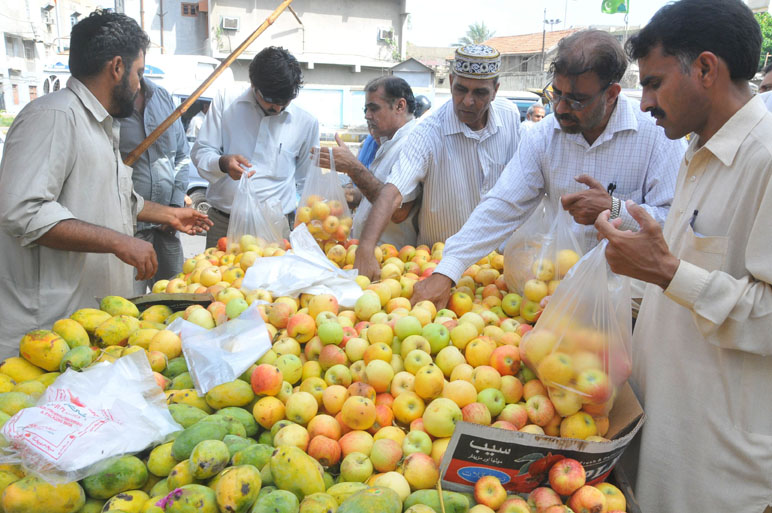
The federal government does not have a legal mandate to check prices across Pakistan and its authority is limited to finding reasons behind recent surge in prices and ‘requesting’ provinces to control this inflation.
After a double-digit increase in prices of perishable and non-perishable food items, the Ministry of Finance on Monday held a meeting of the National Price Monitoring Committee (NPMC) that was chaired by the Adviser to the Prime Minister on Finance Dr Abdul Hafeez Shaikh.
The meeting was attended by all the relevant federal ministers and provincial chief secretaries. A handout issued after the meeting talked more about the reasons behind the skyrocketing prices and less about the solutions.
According to the handout, the prices of essential food items shot up in cities due to increased profiteering owing to weak governance coupled with climatic changes that damaged around 30% of some of the important crops.
The bad governance and weak management is at the heart of the recent wave of double-digit food inflation in the country, noted the NPMC. The meeting was informed that the prices may soon start stabilizing due to imports of essential perishable items from Afghanistan.
However, an official of the Ministry of National Food Security claimed that there was “seasonal” increase in prices and the prices of tomatoes could even jump to Rs400 per kilogram.
The price of tomatoes a week ago was Rs57 per kg while its existing is Rs128 per kg according to the government list of prices.
The food ministry official’s statement shows the approach of the government officials towards an issue, which has affected almost every middle, low middle and poor income groups of the country.
The NPMC is a monitoring and coordination body that does not have any legal mandate to pass instructions to the provinces. The meetings of the NPMC are usually chaired by the secretary or special secretary finance.
Due to backlash from the public and politicians against unchecked price hike, the federal government lately came into action. Special Assistant to the PM on Revenue Dr Waqar Masood Khan had activated the NPMC forum. Dr Waqar Masood Khan is former secretary finance.
The federal food ministry also does not have proper demand and supply monitoring mechanisms. In a recent meeting of the Economic Coordination Committee (ECC) of the Cabinet, the ministry presented a summary to ban export of the potatoes.
After it could not give the reasons behind the proposal, the ECC did not approve the summary.
The NPMC reviewed the prices of essential perishable commodities. It deliberated upon increase in the prices of wheat, sugar and perishable items namely tomatoes, onions, potatoes and chicken and discussed corrective measures to provide relief to the end consumers.
As of October 8, the food inflation increased 11.3%, according to the Pakistan Bureau of Statistics.
Tomatoes prices increased 117%, chili powder 86.3%, potatoes 64.8%, pulse moong 41%, eggs 40.8%, pulse maash 34.7%, sugar 32%, pulse masoor 25.7%, bread 19.4%, wheat flour bag 18.3% and vegetable ghee 17.4%.
The PTI is in power in two provinces while it is part of the ruling coalition in Balochistan. Despite Prime Minister Imran Khan’s personal interest in containing inflation, the provincial governments have failed to honour the words of the premier.
It was stated by the concerned ministries that the reasons behind the price hike include gap in supply and demand due to climatic factors, upward trend in international prices and increased profit margin of wholesale and retailers particularly in metropolitan areas.
However, the provincial chief secretaries, who also attended the NPMC meeting, contested the federal government’s assertion that profiteering was increasing in the cities, said a participant of the meeting.
A federal government official said only in case of potatoes, the retail prices were 24% higher than wholesale market rates, showing the breakdown of the government’s price control mechanisms.
“There was a general consensus that recent rains and Covid-19 have further aggravated the situation,” said the Finance Ministry. The meeting was informed that the crops of tomatoes and onions were damaged in Sindh due to unusual weather patterns.
The handout said Adviser Hafeez Shaikh urged all the stakeholders to take drastic measures to curb inflation. He emphasized the role of district market committees to curb price variation effectively.
“The chief secretaries were directed to minimize price disparity by streamlining the release of wheat at regular intervals to avoid profiteering”, said the Finance Ministry.
However, the NPMC does not have a legal mandate to give instructions to the provinces and its constitutional mandate is limited to only Islamabad Capital Territory in case of prices.
The government’s mishandling of the wheat operations has caused up to 50% increase in its prices and no one is held responsible for this fiasco. There is a need to liberalize the wheat market including wheat import by the private sector to ease the situation.
The functions of the provincial and federal government should be restricted to maintaining the strategic reserves, as the wheat procurements operations remain highly non transparent.
There is also a need to build capacity for correct estimation of cultivated area and expected production in the country for taking timely decisions. There is no authentic database available in the country. The adviser suspected the credibility of the figures produced by the Pakistan Bureau of Statistics.
“The adviser expressed confidence that effective and well-concerted actions by the provincial governments and the concerned ministries will help in controlling the menace of inflation.”
The handout was silent on the role of the federal government in increase of prices of wheat, wheat flour and sugar due to its mismanagement of exports.
Due to excessive exports of wheat and its products, the wheat in retail was sold at Rs2,200 per 40Kg against the government procurement rate of Rs1,400. Pakistan increased wheat support price by 7.7% while procurement price in India was increased by 10%.
The federal and provincial governments also could not meet their wheat procurement targets for 2020 that had been set at 8.25 million tons. The actual procurements were 6.2 million tons.
The government of Punjab did not allow the traders and millers to purchase wheat from farmers at purchase points, which put additional burden on the government’s stocks.
The marketable surplus that was not purchased by the Punjab government had already been stocked by speculators and the hoarders hoping to make windfall profit.


















COMMENTS
Comments are moderated and generally will be posted if they are on-topic and not abusive.
For more information, please see our Comments FAQ